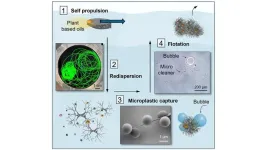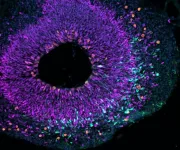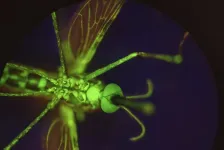EMBARGOED FOR RELEASE UNTIL 4:00 P.M. ET, WEDNESDAY, MARCH 26, 2025
MINNEAPOLIS — People who have early signs of heart problems may also have changes in brain health that can be early signs of dementia, such as loss of brain volume, according to a meta-analysis published on March 26, 2025, online in Neurology®, the medical journal of the American Academy of Neurology. The meta-analysis does not prove that early heart problems cause loss of brain cells; it only shows an association.
“This review shows that better heart health is associated with larger brain volumes, suggesting that the preservation of heart function could help maintain brain health and memory and thinking skills during the aging process,” said meta-analysis author Frank J. Wolters, MD, PhD, of Erasmus University Medical Center in Rotterdam, the Netherlands. “These results add to the importance of early detection and treatment of heart problems.”
The meta-analysis included seven studies from Europe and the United States with a total of 10,889 participants with an average age of 67. The studies measured early signs of heart problems, including systolic and diastolic dysfunction. Systolic dysfunction is when the left ventricle of the heart can’t contract normally and pump blood efficiently. Diastolic dysfunction is when the left ventricle does not relax properly between heartbeats and fill with blood. The studies also used MRI brain scans to measure brain volumes.
The meta-analysis found that people with moderate to severe systolic dysfunction were more likely to have a smaller total brain volume than people with normal systolic function. People with diastolic function problems also had a smaller total brain volume and smaller volume in the hippocampus area of the brain, which plays a role in memory.
“The meta-analysis shows that even mild diastolic dysfunction is associated with adverse brain health,” Wolters said. “Evaluating people who have heart problems—especially impaired diastolic function—for problems with memory and thinking skills could help us detect any cognitive decline early and start interventions.”
Wolters noted that additional studies are needed to investigate the relationship between heart health and brain health, particularly to link imaging findings to important health outcomes.
A limitation of the meta-analysis was that the majority of participants were white people, so the results cannot be generalized to more diverse populations.
Discover more about brain health at BrainandLife.org, from the American Academy of Neurology. This resource also offers a magazine, podcast, and books that connect patients, caregivers and anyone interested in brain health with the most trusted information, straight from the world’s leading experts in brain health. Follow Brain & Life® on Facebook, X, and Instagram.
The American Academy of Neurology is the leading voice in brain health. As the world’s largest association of neurologists and neuroscience professionals with more than 40,000 members, the AAN provides access to the latest news, science and research affecting neurology for patients, caregivers, physicians and professionals alike. The AAN’s mission is to enhance member career fulfillment and promote brain health for all. A neurologist is a doctor who specializes in the diagnosis, care and treatment of brain, spinal cord and nervous system diseases such as Alzheimer's disease, stroke, concussion, epilepsy, Parkinson's disease, multiple sclerosis, headache and migraine.
Explore the latest in neurological disease and brain health, from the minds at the AAN at AAN.com or find us on Facebook, X, Instagram, LinkedIn, and YouTube.
END
Early signs of heart problems linked to smaller brain volumes
2025-03-26
(Press-News.org)
ELSE PRESS RELEASES FROM THIS DATE:
Research finds potential “molecular mimics” behind COVID-induced autoimmune disease
2025-03-26
COVID infection has been linked to higher risk of autoimmune disorders, including rheumatoid arthritis and type 1 diabetes. But why the virus might cause the body’s immune system to go haywire remains unknown, making it difficult to develop therapies to avoid autoimmunity. One hypothesis is that viral “molecular mimics” that resemble the body’s own proteins trigger an immune response against the virus—and healthy tissues get caught in the crossfire.
Now, with advanced data analysis and machine learning, scientists have identified a set of COVID-derived ...
Pennington Biomedical researchers identify neurons in brain that regulate energy levels and body temperature
2025-03-26
FOR IMMEDIATE RELEASE
March 26, 2025
BATON ROUGE – Scientists at Pennington Biomedical Research Center have gained greater clarity in the brain regions and neurons that control metabolism, body temperature and energy use. Featured in the February edition of the journal Metabolism, Dr. Heike Münzberg-Gruening and a team of researchers discovered which chemicals influence the signals that control how much energy the body uses. In “Leptin Receptor Neurons in the dorsomedial hypothalamus require distinct neuronal subsets for thermogenesis and weight loss,” researchers laid out the pathways, chemicals, neurons ...
Cleaning microplastics
2025-03-26
In a new paper, researchers at North Carolina State University show proof of concept for a system that, in a single cycle, actively removes microplastics from water.
The findings, described in the journal Advanced Functional Materials, hold the potential for advances in cleansing oceans and other bodies of water of tiny plastics that may harm human health and the environment.
“The idea behind this work is: Can we make the cleaning materials in the form of soft particles that self-disperse in water, capture microplastics as they sink, and then return to the surface with the captured microplastic contaminants?” said Orlin Velev, the S. Frank and Doris Culberson Distinguished ...
MD Anderson names Jeffrey E. Lee, M.D., Chief Medical Executive
2025-03-26
HOUSTON ― The University of Texas MD Anderson Cancer Center today announced that Jeffrey E. Lee, M.D., an internationally regarded leader in the field of oncology, has been appointed chief medical executive (CME) effective April 1.
Prior to his appointment, Lee served as CME ad interim, demonstrating strength as a leader committed to advancing the institution’s efforts in research, patient care, prevention and education. Assuming the role of CME is the culmination of Lee’s 34-year tenure at the institution, where he has made substantial contributions in the field ...
Sensor technology uses nature’s blueprint and machinery to monitor metabolism in body
2025-03-26
Life’s essential functions are powered by a set of compounds called metabolites, which are involved in every natural process including producing energy, regulating cell activity and keeping the body’s systems in balance. Tracking these molecules offers a window into the onset and status of many diseases, overall health, response to treatment and the intricate workings of biological systems.
However, today’s metabolite sensing methods fall short. Most rely on resource-intensive lab tests that give only brief snapshots from isolated samples. The few sensors that can track metabolites continuously are largely limited to detecting blood sugar.
An interdisciplinary ...
Chan Zuckerberg Initiative announces new biohub to develop breakthrough imaging technologies to observe cells in action
2025-03-26
REDWOOD CITY, Calif. (March 26, 2025) — The Chan Zuckerberg Initiative (CZI) announced a new grand challenge to develop groundbreaking imaging technologies to transform how scientists observe, measure and understand living cells and organisms. CZI’s two powerhouse institutes, CZ Biohub San Francisco and CZ Institute for Advanced Biological Imaging, will leverage their complementary expertise to form a new Biohub unmatched in the field of life science imaging research. They will combine their teams at a new science campus in Redwood City, Calif., adjacent to CZI ...
Encryption breakthrough lays groundwork for privacy-preserving AI models
2025-03-26
In an era where data privacy concerns loom large, a new approach in artificial intelligence (AI) could reshape how sensitive information is processed.
Researchers Austin Ebel and Karthik Garimella, Ph.D students, and Assistant Professor of Electrical and Computer Engineering Brandon Reagen have introduced Orion, a novel framework that brings fully homomorphic encryption (FHE) to deep learning — allowing AI models to practically and efficiently operate directly on encrypted data without needing to decrypt it first.
The implications of this advancement, ...
Top global award for young technologists goes to researcher who advanced AI with high-performance computers
2025-03-26
ACM, the Association for Computing Machinery, today named Torsten Hoefler, a Professor at ETH Zurich, the recipient of the 2024 ACM Prize in Computing for fundamental contributions to high-performance computing and the ongoing AI revolution. Hoefler developed many of the core capabilities of modern supercomputers and defined key aspects of the algorithms for distributing AI models on them.
The ACM Prize in Computing recognizes early-to-mid-career computer scientists whose research contributions have fundamental impact and broad implications. ...
How did the large brain evolve?
2025-03-26
The results of the study show that the two genes act in a finely tuned interplay: one ensures that the progenitor cells of the brain multiply more, while the other causes these cells to transform into a different type of progenitor cell - the cells that later form the nerve cells of the brain. In the course of evolution, this interplay has led to the human brain being unique in its size and complexity.
The newly gained insights not only provide a deeper understanding of the evolutionary development of our brain but could also help to better comprehend how certain developmental disorders or diseases of the brain arise. ‘Our findings deepen the fundamental ...
Rare disease drug nitisinone makes human blood deadly to mosquitoes
2025-03-26
In the fight against malaria, controlling the mosquito population is crucial.
Several methods are currently used to reduce mosquito numbers and malaria risk. One of these includes the antiparasitic medication ivermectin. When mosquitoes ingest blood containing ivermectin, it shortens the insect’s lifespan and helps decrease the spread of malaria.
However, ivermectin has its own issues. Not only is it environmentally toxic, but also, when it is overused to treat people and animals with worm ...





